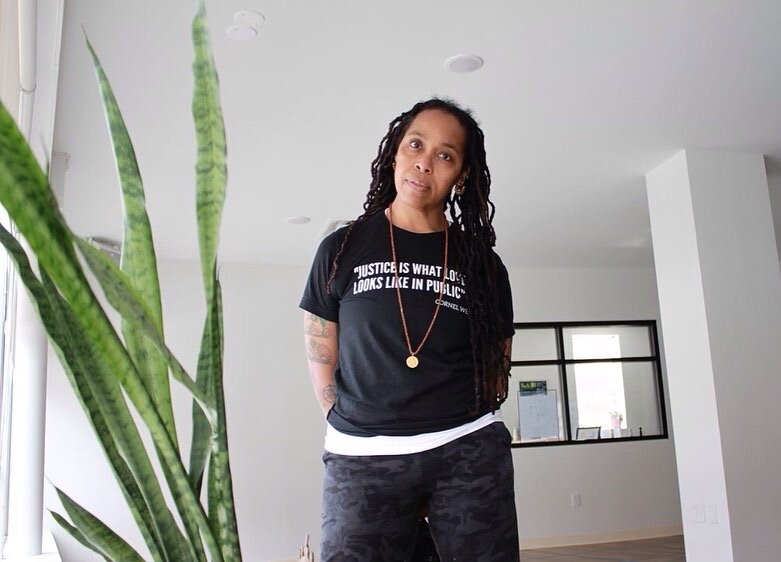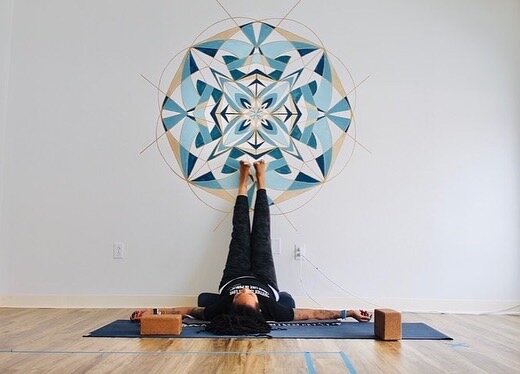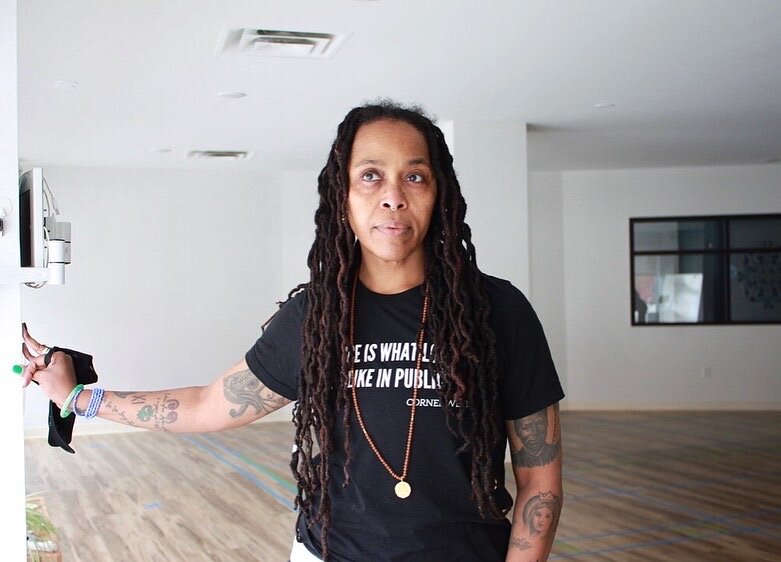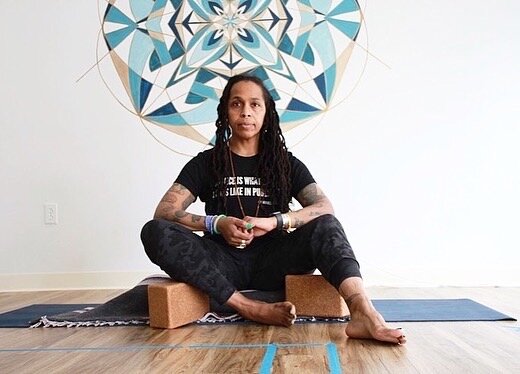imani olear
“Remembering how I felt drew me back. Realizing that my children needed me drew me back. The mat has been the only time that I felt as if I had some control over something — autonomy, maybe, over my body that seemed to be used by others; the same body that seemed to rebel against me. When I moved — and when I move — I feel connected to my deeper self that is lighter.”
NAMI: Have you ever had any mental health struggles? Do you live with a diagnosis? What has your experience been?
Imani: I'm in a mental health struggle currently. I have struggled with increased anxiety since the pandemic, although I've always had some struggles with anxiety. My two diagnoses are anxiety and bipolar II. I'm currently in regular counseling due to some rapid cycling. The diagnosis and treatment have always been a struggle for me. My mother, who had bipolar I and schizophrenia, and endured electric shock treatments for years, made me very afraid to get help. My diagnosis came around 15 years ago. It was a struggle to work with doctors to try to combine lifestyle changes and medication. Breath by breath is how I've managed through the struggles. After my short stint in St. Mary’s, and outpatient treatment in 2008, I have tried to keep an active regimen of walking and yoga with meditation. This has helped me feel like I'm an active participant of my own healing, versus being told what I need.
NAMI: What does recovery mean to you?
Imani: I think we all are in recovery from something, so there is that for me. But I also know that it is something that I live with, and it no longer feels like the boogey man coming to get me in the middle of the night. I can look into my own eyes and see beauty in the darkness — some days it just takes longer. Recovery for me means regaining what has been lost or stolen, and sometimes that has been an awareness of the gift that is me. I am always recovering back to my truest self.
NAMI: One of the greatest challenges we face in America is the lack of access to good mental healthcare and other healing entities — such as yoga — for BIPOC. It's no secret that the Black community suffers greatly from inaccessibility issues, often due to financial hardship. How does your work through Yoga 4 A Good Hood combat this problem?
Imani: We show up wherever and however the community needs us — to show them that, in the midst of it all, they are deserving to be able to take a breath. The amount of trauma that is experienced in the community of always running, running, and running — it seems that there is no space to slow down and to be seen. We try to be a space where the community knows they are safe. Our fault tolerances are: childcare offerings, bus passes, and pay what you can. Those are ways that we combat the problem. We also have teachers that look like those that are showing up on the mat, with similar life experiences.
NAMI: In your TEDxRochester talk, you spoke of how you returned to the mat after different traumatic events. What drew you back to yoga? How has yoga healed you from trauma?
Imani: Remembering how I felt drew me back. Realizing that my children needed me drew me back. The mat has been the only time that I felt as if I had some control over something (not like a "control freak” — I recognize the negative connotation, but couldn't think of another word), but autonomy, maybe, over my body that seemed to be used by others; the same body that seemed to rebel against me. When I moved — and when I move — I feel connected to my deeper self that is lighter.
NAMI: In your own words, how does exclusion and invisibility — the lack of seeing folks that look like you — in the wellness community affect mental health?
Imani: Exclusion and Invisibility make you feel unworthy. Unseen. Unimportant. I remember one studio said to me "that is not our fault," and I quickly knew that I wasn't valued and my opinions didn’t matter.
NAMI: What forms of mental health-related stigma have you observed or run into personally? Do you feel like you have mental health support or is it challenging to find support?
Imani: The stigma that I struggle with most regarding mental health is that I can't even tell people I'm struggling — only really my counselor — because whenever I do, I have to end up caring for people who are like, “Oh my god, not you," or "you’re so strong," or "you are a bad b*tch, you got this.” No, I don't sometimes. So I suffer many times in silence. I try to say, “No, I'm not ok,” but it’s usually brushed off. So I go to therapy weekly, and try to watch my alcohol intake (that is always an indicator if I'm not ok).
NAMI: What do you personally think needs to change or be improved to make Rochester mentally healthy for all folks of all colors, genders, sexual orientations, etc.?
Imani: One way, I believe, is more access to yoga that is open to many levels of experiences. More conversation around the impact of the pandemic / social unrest / racism and police brutality — and that this isn't normal, so we don't have to pretend like it is. And pie in the sky, not that I want more government involvement, but real mental health days for employees, and making sure counseling that is supportive for the person (not just traditional means) is accessible.
NAMI: Have you ever supported a close friend or loved one through mental health struggles? What was that like?
Imani: Yes. My relationship with my mother, Connie, through her mental health struggles was a gift to me in many ways. It taught me a different way to see patience and moments of joy. It also was a gift that she trusted me with the "dark night of the soul" that she experienced so often. Because she also struggled with paranoia, it was a constant, at times, giving her reassurance that she was safe. It was exhausting, for sure, but when she was "clear," and able to articulate what she was going through, it gave me a tremendous amount of learning around empathy.




